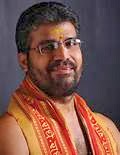The Process of Yoga : 3-5. Swami Krishnananda.
=========================================================================
=========================================================================
Monday, December 26, 2022. 07:00.
Chapter 3: Recognising the Independent Status of Things-5.
=========================================================================
We are not absolutely independent in any respect. We are totally dependent on many things for our very existence. Nobody in this world can be wholly independent. The entire independence that we are asking for is possible only in the Absolute Spirit. Until the achievement of the Absolute Spirit, true independence is not possible.
The study of consciousness is really the study of yoga. It also involves the study of the object. Both mean one and the same thing. Thus, when we study the subject of consciousness and study the object as independent from each other, we come a cropper. We do not know what we are speaking of, and how this could be achieved. All these subtle matters are difficult to explain logically and scientifically. They are better explained by analogies, comparisons, etc.
I shall give an example as to what a scientific object is, independent of an ethical object or a social object. Take a human being. If we ask who this person is, the answer would be, “He is my father; he is my brother; he is my friend; he is my colleague; he is my boss; he is my subordinate.” These are the ways in which we generally describe a person. But is this really the person in himself? Is he nothing if he is not a father, a brother, a friend or an enemy? Suppose a person has no child; we do not call him a father. The idea of father is gone automatically when there is no child. But yet that person has some characteristics independent of being a father. He may not be a boss, he may not be a subordinate, he may be an only child, perhaps he may not be a friend or an enemy of anyone, and he may not occupy any status in society. It is very difficult to always explain the relationship of a person in terms of external contact, but this is what we try to do. We are habituated to giving this slipshod description. This is the social description of a thing, and not the scientific description.
he scientific description of a person is the description in terms of a characteristic which is inherent in that person. If you are not a president, if you are not a prime minister, if you are not a rich man, if you are not a poor man, if you are not anything that can be described by society, what are you? Suppose you are in the wilderness, in the thick of a jungle, and nobody sees you, nobody knows you, and nobody wants you. You will have a characteristic of your own, independently. When you are dispossessed of everything, you still exist as a person. That personality of yours, that body of characteristic in you, existing and subsisting independent of external relationship, is the scientific description of your personality.
The object as it is independently is incapable of observation because the very process of observation disturbs the activity of the object. In a laboratory there is no other way of observing a thing except through an instrument. Whatever be the subtlety of our observation in a laboratory, it is all dependent on the structure of the instrument that we make use of. But if the very presence of the instrument disturbs the presence of the object, the object's essential characteristic cannot be known. They say that even at this moment of advanced scientific discovery [1972], the actual characteristic of the inner content of an atom is not known. What is it made of, and how does it behave? What is the velocity with which it moves? All this has not yet been known or seen, because the very instrument with which they are trying to observe the moments of the contents of the atom disturbs the movement of the atoms. Likewise, the way in which we perceive the object disturbs the very presence of the object, so that the object as such cannot be known. Hence, no one in the world can be omniscient. Sarvajnattva is not given to us. Nothing can be known entirely by its physical structure.
But there is a superior, super-mental method of knowing things as they are – by not disturbing their existence, by not calling them by name, by not looking at them as external things, but by looking at them as they are in themselves. You know very well, if I adore you, regard you, respect you from your own point of view, you will be more friendly towards me than if I judge you from my point of view. You are a person of some status from your own point of view. Everyone has a certain status of his own or her own. If we take the point of view of that person's status from his or her own standpoint, there is a greater possibility of amicable relationship than if we judge that person from our point of view.
Suppose we have a subordinate or a servant. If we always make that person feel that he or she is a servant, and whenever we summon that person we give the impression that he or she is our underling; that is one way of treating a person. But suppose, though the person is our servant or a subordinate, we do not give the impression that he or she is a servant or a subordinate, and we speak in an affectionate manner as if he or she is our equal, we will know what difference it makes. Perhaps that servant will do more work for us than if we treat that person as a servant. This is because the status of the person has been raised by our recognising his or her independence.
*****
To be continued
========================================================================













Comments